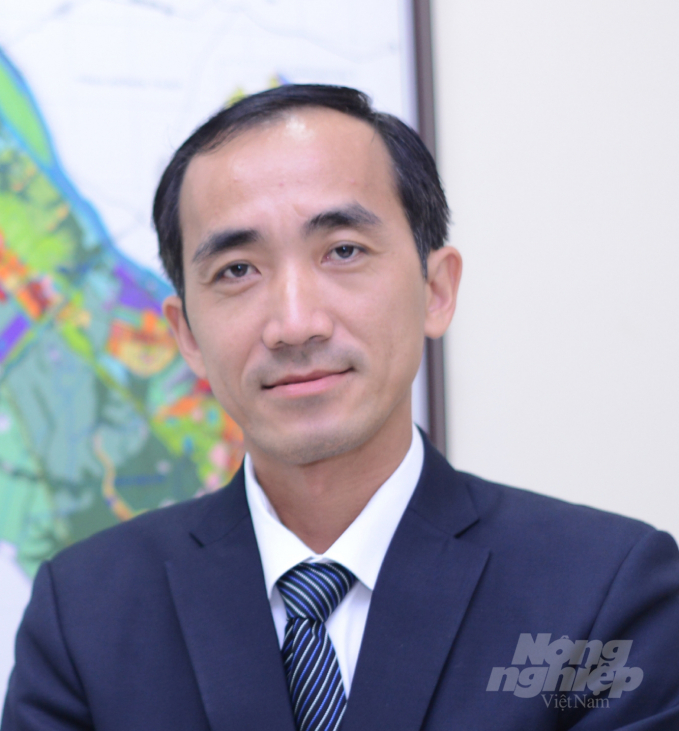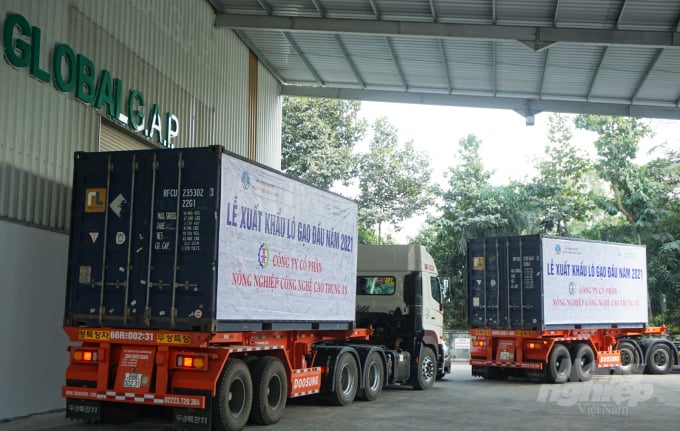November 25, 2025 | 20:19 GMT +7
November 25, 2025 | 20:19 GMT +7
Hotline: 0913.378.918
November 25, 2025 | 20:19 GMT +7
Hotline: 0913.378.918

Mr. Nguyen Phuong Lam, Director of VCCI - Can Tho Branch. Photo: HV.
Mr. Nguyen Phuong Lam, Director of VCCI - Can Tho Branch, said that the seaport transport infrastructure in the Mekong Delta only meets a tiny part of the actual demand. It is an obstacle to promoting the development of production and export of goods.
The Covid 19 pandemic is a unique event that has seriously affected the world economy, including Vietnam. The Mekong Delta has been severely affected, facing disease prevention and economic crisis with the southern provinces.
The pandemic has "warned" and revealed limitations from state management to business operations of enterprises. After two years of the pandemic, for the first time, the Mekong Delta had a growth rate of only 1.57%, lower than the national average after more than three decades of development. In some localities, the negative growth rate was quite deep, which greatly affected the socio-economic development stage in the 5-year plan.
However, production and business activities have normalized when the epidemic has been controlled, but the consequences are still significant. In the Mekong Delta, the supply of agricultural and aquatic raw materials is unstable because production resources have not been restored.
Farmers, cooperatives, and farming businesses are still cautious and bewildered by the recent epidemic. The consumption market is not stable, and resources are limited, affecting the development of critical economic sectors in the Mekong Delta.
Authorities and businesses in the Mekong Delta have adapted quickly and have found reasonable adaptation solutions. After three months of separation, many economic recovery policies were developed, creating favorable conditions for businesses to restart production and business, and companies also made efforts to restore trade.
As a result, production quickly resumed, export turnover in the last two months of the year increased sharply, contributing to a sharp increase in the export turnover of goods of the whole region compared to 2021 to reach US$ 19 billion, higher than compared to 2020.
In addition to the limitations revealed by the pandemic, the Mekong Delta's economy also faces many difficulties from the outside, especially in the pandemic and post-Covid period, with high transportation costs, shipping rates, and logistics costs increasing sharply, making the production capacity and competitiveness of enterprises less.
Suppose external difficulties can't be interfered with. In that case, it will only be through the pandemic that the production chain operation system and logistics support services are essential but have not been properly invested.

It is necessary to remove bottlenecks in the production and export of agricultural and aquatic products in the Mekong Delta. Photo: HV.
Currently, the system of gateway seaports for exports is the bottleneck of the Mekong Delta's economy. Previously, transport infrastructure was a limitation, but now port and logistics infrastructure is a shortcoming of the Mekong Delta.
According to data, the volume of goods transported in the Mekong Delta is currently estimated at over 150 thousand tons, 4.5 times higher than in 2002 (33,366 thousand tons). The average growth of freight transport from 2002-to 2020 is 8.7% per year, but the Mekong Delta seaport system can only handle 15% of exported goods.
Regarding warehouses, the Mekong Delta owns about 30% of the cold storage in the southern region, mainly distributed in Long An, Can Tho, and Hau Giang, while the current demand for the agricultural and fishery industry is vast, including fruits and vegetables that do not seem to have been refrigerated.
Therefore, the planning and development of logistics centers are the most critical and urgent problems to solve today to remove bottlenecks for agricultural exports and increase the value of agricultural goods.
The Government has been drastic in operating in the past time through timely decisions to restore the economy. There are also significant efforts to implement many practical support programs at the local level, creating strong confidence for the business community after the pandemic. Despite many difficulties, businesses see confidence, and the economy is recovering strongly.
The manufacturing industry needs effective financial policies for the business community to support farmers and farming businesses to create stable output and raw materials.
Logistics is almost newly formed in the Mekong Delta, still too low compared to the needs and development potential for a large agricultural area. Therefore, it is necessary to plan and develop logistics clusters in large centers and develop preferential policies for enterprises to invest in logistics infrastructure to immediately support the critical economic sector.
In addition, macroeconomic policies need to be stable and have reasonable and practical adjustments, especially in response to fluctuations in fuel prices and agricultural inputs.
Translated by Ha Phuc
/2025/11/25/0045-1-135246_13.jpg)
(VAN) Ca Mau is researching a model of sea-encroaching embankments combined with viaducts and logistics service zones, aiming both to prevent erosion and create land funds for marine economic development.

(VAN) The information was shared at the seminar 'Urban Agriculture - Solutions for Developing Green Spaces,' organized by the Kinh te & Do thi Newspaper and the Biotechnology Center of Ho Chi Minh City.
/2025/11/19/4141-2-132831_216.jpg)
(VAN) One of Japfa's outstanding solutions is implementing digital transformation and artificial intelligence (AI) to optimize operations, enhance productivity, and advance sustainable development.
/2025/11/19/4847-1-093540_448.jpg)
(VAN) The Gia Lai Provincial People’s Committee had a working session with the delegation of the U.S. Department of Agriculture, the State of Idaho, and representatives of the State's leading enterprises.

(VAN) Ca Mau has a sufficient foundation to become a strong regional aquaculture center, where production integrates the economy, the environment, and the lives of the people.

(VAN) SEIKI Group envisions itself as a pioneer in the ‘dual transformation’ of digital technology and green industry, standing alongside the Government and Vietnamese businesses in their pursuit of sustainable development.

(VAN) The VNGEONET network affirms Viet Nam's progress in mastering digital space, providing a precise positioning data platform to serve socioeconomic development.